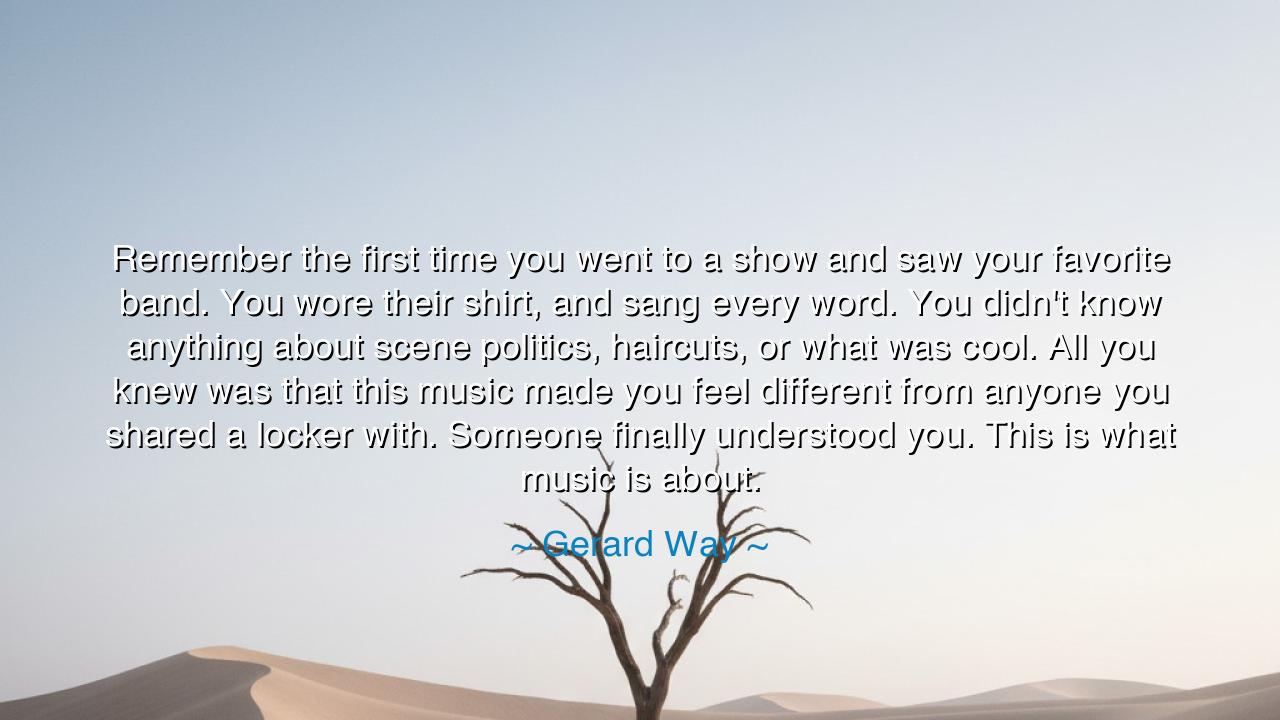
Remember the first time you went to a show and saw your favorite
Remember the first time you went to a show and saw your favorite band. You wore their shirt, and sang every word. You didn't know anything about scene politics, haircuts, or what was cool. All you knew was that this music made you feel different from anyone you shared a locker with. Someone finally understood you. This is what music is about.






In the annals of human experience, there are moments when the soul awakens, when the heart stirs with a familiar resonance that speaks directly to the core of our being. Gerard Way’s words, “Remember the first time you went to a show and saw your favorite band. You wore their shirt, and sang every word. You didn't know anything about scene politics, haircuts, or what was cool. All you knew was that this music made you feel different from anyone you shared a locker with. Someone finally understood you. This is what music is about,” capture the essence of those transformative moments. They remind us of the raw, unfiltered power of music—a force that transcends identity, social norms, and external expectations, and speaks directly to the deepest part of who we are.
There is a sacredness in music, a kind of primordial connection that humans have always felt. From the earliest drums of ancient tribes to the symphonies of the great composers, music has served as a bridge between the human spirit and the divine. It speaks the language of the soul, bypassing the intellect, the judgment, and the divisions that we often place between ourselves. In that moment when we first experience the perfect song or hear a voice that seems to speak our innermost thoughts, we feel something profound. This is the feeling Gerard Way describes—the moment we realize that, through music, we are not alone.
Think of Homer's Iliad, which recounts the valor of warriors and the struggles of men. In those times, warriors would gather around the fire to hear stories sung by bards, their music and poetry binding them together in shared experience. The power of that music was not in its complexity, but in its ability to unite. Each listener could hear the same tale, but the music would speak to each person differently, stirring emotions and memories unique to them. So it is with the music Way speaks of—the first time you hear that song and know, without question, that it was written just for you. In that moment, you feel understood.
Music transcends the confines of culture and social structure. It is a universal language. It does not ask if you are wealthy or poor, if you are young or old, if you are popular or unknown—it only asks that you listen. Take the example of Beethoven, who, though deaf, composed some of the most profound music the world has ever known. He too experienced this connection to something greater than himself, something that spoke not through his ears but through the very depths of his spirit. His music was an expression of the divine, a gift that speaks to all generations, from the courtly halls of Vienna to the most humble gathering of hearts today. Beethoven’s symphonies, much like the music Gerard Way speaks of, make us feel that we are not alone—someone understands us.
Way's reflection brings us back to our own experiences. How many of us can recall the first time we heard a song that seemed to reach into our hearts and reveal our truest self? It is not merely the melody or the lyrics that move us; it is the truth they contain. The feeling that someone, through their art, has captured our essence and reflected it back to us. This moment is sacred. This is the magic of music—its ability to create community, not through shared experiences of the world, but through shared experiences of the self. In the music, we find ourselves, and in that moment, we know that we are seen.
The lesson here, then, is twofold. First, to remember the transformative power of music—not as a passive form of entertainment, but as a living force that speaks directly to the heart. It is a reminder that music, in its purest form, is about connection. It is about feeling understood, about finding your tribe, even in the most unexpected places. Music does not care for appearances or trends; it cares only for the truth it brings to the surface. Second, we must allow ourselves to be vulnerable in this experience. Music asks for nothing but our presence, our willingness to be open to the beauty it has to offer.
To live fully in this moment, we must embrace music as a sacred expression—a force that, like the first time we heard our favorite band, makes us feel alive, makes us feel understood. So let us allow ourselves to dance, to sing, to experience the raw joy of music without the fear of judgment. Let us not worry about whether we are “cool” or “slick,” but simply embrace the freedom and connection it offers. Like the warriors around the fire or the first time we sang along to that song in a crowded room, let us remember that music is not about perfection; it is about the truth that it reveals, and the joy it brings. And in this truth, we are not just individuals—we are part of something greater, something universal, something that binds us all.






AAdministratorAdministrator
Welcome, honored guests. Please leave a comment, we will respond soon